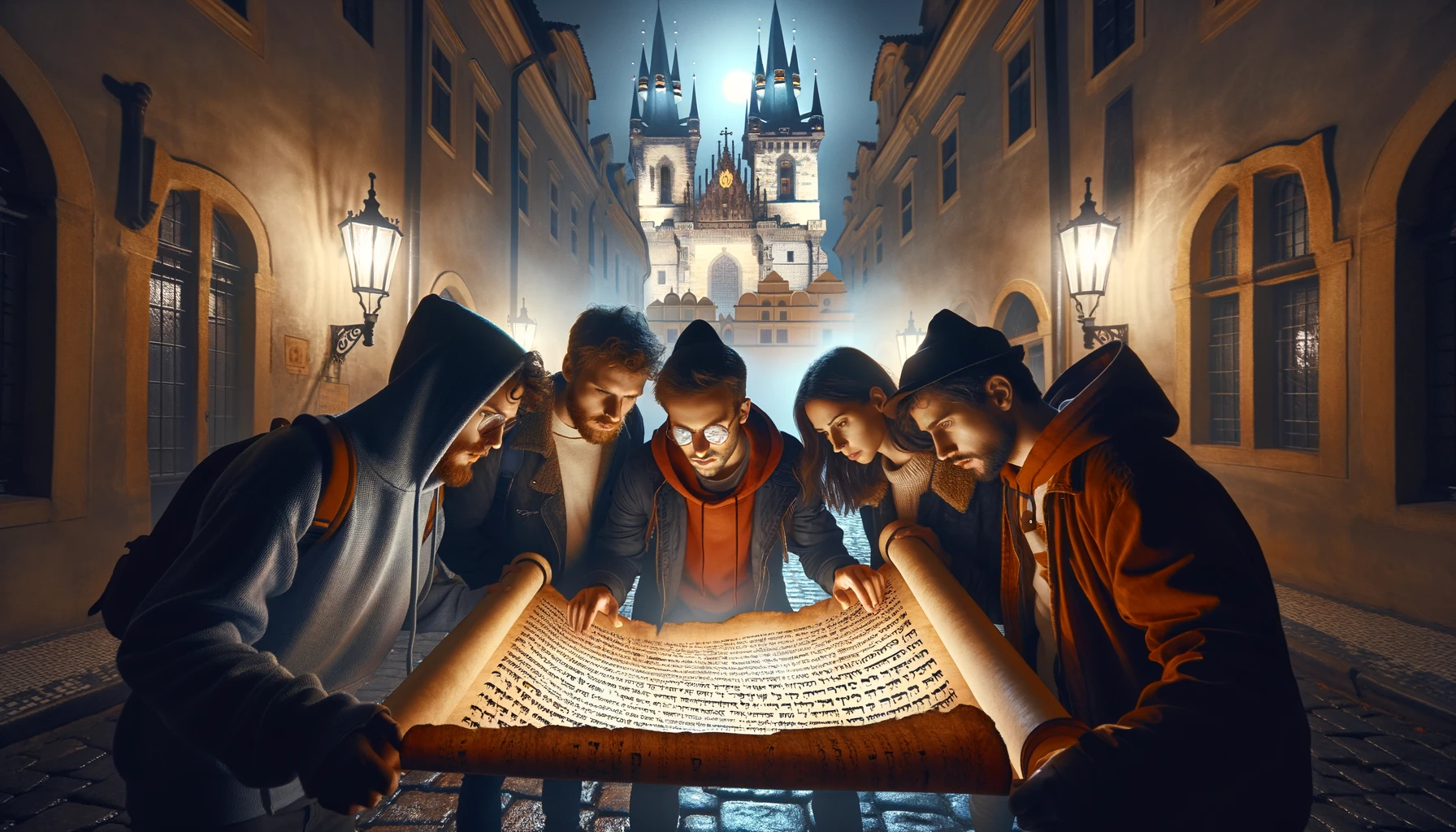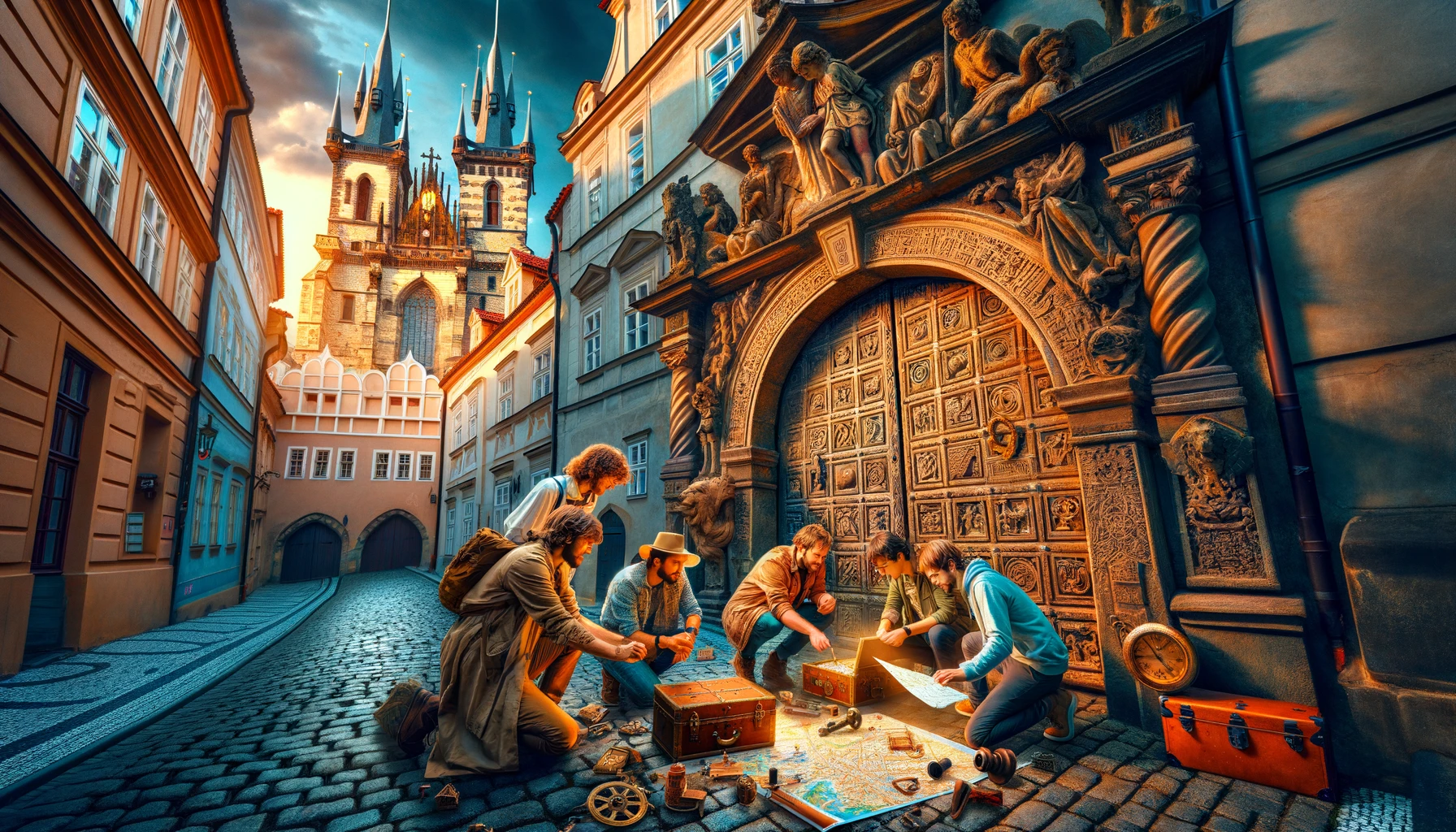 Zpět na seznam
Zpět na seznamDiscover Prague’s Jewish Heritage with Outdoor Escape Games

Hello adventurer!
Welcome to the fifth article in the series “Walks through Prague,” where we will explore a unique combination of historical discovery and modern adventure through outdoor escape games. If you are a history enthusiast and love solving puzzles, outdoor escape games in Prague are the perfect entertainment for you. Imagine exploring the beauty and secrets of Prague while solving interesting tasks and uncovering the city’s hidden stories.
In the previous articles, we explored various parts of Prague. If you haven’t read them yet, you can find them here:
- From Petřín Lookout Tower to Nerudova Street: Escape Games as a Guide to History in 2024
- Explore Prague’s Lesser Town like never before: adventure through outdoor escape games
- Mozart, Kepler, Rudolf II. in the Lesser Town: The Magic of Outdoor Escape Games
- Prague’s Jewish Town: Escape Games as a Journey to the Past
Today, we will focus on Jewish monuments in Prague that you can see or visit while playing outdoor escape games. Let’s take a look at the Klausen Synagogue, the Old Jewish Cemetery, the Maisel Synagogue, and the Spanish Synagogue.
Klausen Synagogue
The Klausen Synagogue is a fascinating place worth visiting. The synagogue’s name comes from three buildings (klaus), which were originally part of the complex. One of these klaus served as a school, another as a hospital, and the third as a prayer house.
Founders
The Klausen Synagogue was founded in 1694 by a community of wealthy Jewish patrons. Among them was Mordechai Maisel, who financed many construction projects in the Prague ghetto. His contribution was crucial for the development of the Jewish community in this area.
Baroque Architecture
The synagogue is a rare example of Baroque architecture in the Jewish quarter, in contrast to the more traditional Gothic and Renaissance synagogues in Prague. Its interior and exterior are adorned with rich Baroque elements, making it a unique architectural gem.

Museum
Today, the Klausen Synagogue is part of the Jewish Museum in Prague and hosts an exhibition dedicated to Jewish holidays and customs. The museum was founded in 1906, making it one of the oldest Jewish museums in the world. The exhibition provides a detailed look into Jewish traditions and cultural heritage.

Torah
The Klausen Synagogue houses rare hand-written Torah scrolls from the 18th century, which survived the Holocaust and are now valuable historical artifacts. These scrolls are significant symbols of Jewish faith and history.
Old Jewish Cemetery
The Old Jewish Cemetery is one of the oldest preserved Jewish cemeteries in Europe, founded in the first half of the 15th century. Its atmosphere is incredibly impressive and full of historical references.

Founders
The oldest preserved tombstone in the cemetery belongs to Rabbi Avigdor Kara and dates back to 1439. This cemetery is the resting place of many significant figures in the Jewish community, making it an important historical site.
Overlapping Layers
Due to limited space in the cemetery, the tombstones are placed in layers. There are up to 12 layers of graves, evidence of the cemetery’s centuries-long use. This method of burial is unique and adds a specific atmosphere to the place.
Rituals
Given the importance of burials and related rituals, a tradition arose where everyone who visits the cemetery places stones on the tombstones as a sign of respect and remembrance. This custom continues to this day and symbolizes respect for the deceased.

Notable Personalities
Among the significant figures buried in the Old Jewish Cemetery is Rabbi Judah Loew ben Bezalel, also known as Maharal, who is associated with the legend of the Prague Golem. Maharal’s grave is one of the most visited in the cemetery.
If you’re interested in the story of the Golem and would like to experience an adventure related to this legend, be sure to try the outdoor escape game Legend of the Golem.
Inscriptions and Symbolism
The tombstones in the cemetery are decorated with various symbols and inscriptions that have deep meanings. For example, the lion is a symbol of the name Loew, referencing Rabbi Loew. You will also find symbols of books, crowns, and other iconographic elements that provide information about the lives and professions of the deceased
Maisel Synagogue
The Maisel Synagogue is another fascinating place worth visiting. It was built at the end of the 16th by wealthy Jewish banker and philanthropist Mordechai Maisel, who was also a financial advisor to Emperor Rudolf II.

Renaissance Style
The original building was designed in the Renaissance style, which was unusual for Jewish synagogues at that time. Unfortunately, it was rebuilt several times, most recently in the Neo-Gothic style at the end of the 19th century. This mix of architectural styles makes it a unique structure.
Fire
In 1689, the synagogue was destroyed by a great fire in the Prague ghetto, which destroyed much of the district. The synagogue was subsequently rebuilt but suffered significant damage. Nevertheless, it remained an important place for the Jewish community.

Cultural Center
At its inception, the Maisel Synagogue served not only as a place of worship but also as a cultural and educational center for the Jewish community in Prague. There was a school and library used by Jewish scholars. The synagogue thus played a key role in the cultural life of the community.
Museum
Today, the Maisel Synagogue is part of the Jewish Museum in Prague and hosts an exhibition dedicated to the history of Jews in Bohemia and Moravia from the 10th to the 18th century. The museum presents a number of valuable artifacts, including manuscripts, books, and liturgical objects. The exhibition provides visitors with a detailed view of the history of Jewish life in this area.
Spanish Synagogue
The Spanish Synagogue is one of the most impressive examples of Moorish Revival style in Europe. Built in 1868, its interior is richly decorated with intricate geometric patterns and arabesques, reminiscent of the Alhambra in Granada.

Moorish Revival Style
The synagogue got its name because of its interior, which resembles Moorish architecture of Spain. This style was very popular among Jewish communities at the time, who wanted to remind themselves of their roots in the Iberian Peninsula before the expulsion of Jews from Spain in 1492.

Previous Buildings
The Spanish Synagogue stands on the site of the oldest Prague Jewish prayer house, called Altschul or Old School, which was built in the 12th century. The original building was demolished to make way for the new synagogue.
Musical History
The synagogue has a long musical history and is known for its excellent acoustic environment. In the past, significant Jewish composers and musicians performed here, including Franz Schubert, whose works were often played here. The acoustics of the synagogue are still appreciated today and used for various cultural events.
Museum
Today, the Spanish Synagogue is part of the Jewish Museum in Prague and hosts an exhibition dedicated to the history of Jews in Bohemia and Moravia from emancipation to the present. Special attention is paid to the Holocaust period and the post-war renewal of the Jewish community. The museum displays valuable artifacts, photographs, and documents that illustrate the history and culture of Jewish life in this area.

Conclusion
Outdoor escape games in Prague are a great way to get to know the city from a different perspective. Visiting the Klausen Synagogue, the Old Jewish Cemetery, the Maisel Synagogue, and the Spanish Synagogue, you can experience not only historical discovery but also enjoy fun and adventure while solving puzzles. If this way of exploring the city interests you, don’t hesitate to try the outdoor escape game Legend of the Golem, which takes you right into the heart of the Jewish town.
Discover the charm of the city and its secrets waiting just for you!
We look forward to your experiences from escape games in Prague and hope that this article helped you plan your next adventure.




